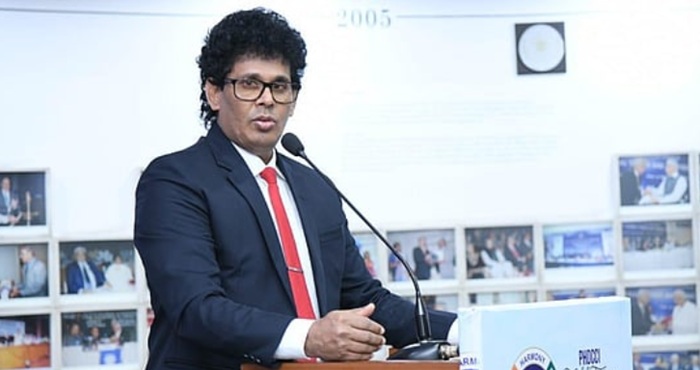
Minister of Trade Wasantha Samarasinghe says Sri Lanka is working to address the trade imbalance with India by utilizing provisions in its existing trade agreement to increase Sri Lankan exports to India.
India is Sri Lanka’s largest trading partner and was one of the first countries with which Sri Lanka signed a Free Trade Agreement (FTA).
Recently, the PHD Chamber of Commerce and Industry (PHDCCI) hosted an interactive business session with a high-level Sri Lankan delegation led by Minister Wasantha Samarasinghe.
In an exclusive interview with Pushpita Dey from the New Indian Express, Minister Wasantha Samarasinghe discussed Sri Lanka’s desire to welcome more Indian investors.
Edited excerpts of the interview are as follows;
India is Sri Lanka’s largest trading partner. How do you foresee the balance of trade between the two countries in the coming years?
India is our most important trading partner. While we import many consumer goods from India, the country has also provided significant support to Sri Lanka during difficult times. We are working to address the trade imbalance by utilizing provisions in our existing trade agreement to increase Sri Lankan exports to India. We have plans to enhance our export facilities and are focusing on boosting shipments of garments, textiles, tea, and other products to the Indian market.
Given the rise of regional trade agreements like RCEP, which Sri Lanka is seeking to join, how do you plan to balance your trade strategy between India, China, and other Asian partners?
We have several existing trade agreements with regional countries. However, many were signed years ago, and the global landscape has changed dramatically. We need to revisit and modernize these agreements—both regional and bilateral—with partners like China, India, and Bangladesh. We have already signed agreements with Thailand and Singapore and are receiving interest from others. When we sign a new agreement, it must be a win-win situation for both sides, which requires careful consideration and negotiation.
Indian investment in Sri Lanka has been rising, especially in hospitality and tourism. How is your ministry working to attract more Indian investors?
Indeed. We have opened our hospitality sector to investors from around the world, including India. This sector is primarily private-driven. The government’s role is to facilitate, not control or restrict. We provide the regulatory framework and facilitation for anyone wishing to invest. We believe there is a significant opportunity in Sri Lanka’s hospitality sector, and we would certainly like to see more Indian investors participating in it in the near future.
How do current geopolitical shifts—such as supply chain diversification and global trade tensions—impact Sri Lanka’s trade relations with India and other countries?
The current geopolitical situation creates challenges, such as reciprocal tariffs imposed by the US and other nations. This requires us to balance our approach and work collaboratively with partner countries. While these tariffs can limit benefits, we must adapt. If certain markets become difficult due to tariffs, we will seek new ones. So, while geopolitics presents difficulties, it also opens up opportunities. Our plan is to find these new opportunities and markets.
The Adani Group withdrew from a 484 MW wind project after the Colombo government allegedly moved to renegotiate the terms. Can we expect Adani or other Indian conglomerates to restart the project?
Of course. For that specific wind power project, the bid price from the Adani Group was considerably higher than the market rate. The unit price they offered was 8 cents, whereas comparable projects in India are around 3 cents. To provide context, Sri Lankan investors were bidding at around 4.6 cents for projects in India. We conveyed our concerns about this price disparity. The Adani Group is welcome to reconsider and revise their price
As a government, we must evaluate every investment based on its impact on our people and the country. This principle applies to all investors, including Adani or any other Indian conglomerate. Any Indian investor is welcome to invest, provided the terms are mutually beneficial and positive for Sri Lanka. Adani can certainly reconsider this project, and we are open to all serious investors. (New Indian Express)
